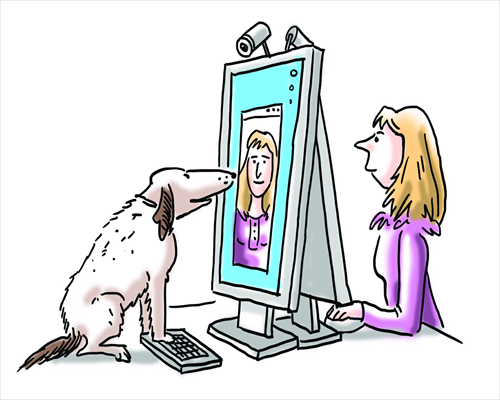HOME >> OP-ED
Familiarity breeds contempt in spam emails
By Rong Xiaoqing Source:Global Times Published: 2013-11-28 23:23:01

Illustration: Liu Rui/GT
Most people using email today have developed some basic skills to quickly spot spam. Emails sent from unfamiliar names, those with no subjects, those with subjects like "super hot girls, "winning notification" or "your account will be closed," and those that address you by whatever you put in front of the @ in your email account - all can basically be deleted without being opened.
But one particular email I got on November 18 was different. It was from a familiar name with the subject "chat tonight?" addressing me by my first name, ending at "talk soon," and signed only with the first name of the sender. An old friend, you might think. Well, I don't know I can claim that is so since the sender is the US president.
This is the second time I have had an email from "Barack" this month. The earlier one, with the subject "Xiaoqing, I want to talk with you directly," ends with "I cannot wait to catch up" and a ps line reminds me he hasn't been able to do so for a long time.
Both meant to ask me to participate in a teleconference in which the president would talk about his policy plans to supporters.
And these are only part of the dozens of such first-name-based emails I have received from the president in the past few years. And another dozen or so are from Mrs Obama with subjects like "Xiaoqing, it's me" asking me to fill in a survey about "the No.1 issue" I care about, or "Barack is getting outraised" asking me to donate money.
I've never had the honor of meeting or talking to the first couple. Yet, in the online world we are so close. I have to forget the fact that I am one of the probably tens of millions of people who received such emails, which were probably written by some White House subordinates or interns whose first names the president may or may not know. That concern fades given our warm and very tight virtual e-relationships.
The president, who cleverly used social media to win his first and second election victories, is clearly not the inventor of the personalized impersonal coziness on the Internet.
Such behavior has been proliferating rapidly in the online space in recent years. The famous "Taobao style" which was created by the Amazon-like e-commerce website Taobao and starts every promotional message with an intimate greeting "qin" - similar to "honey" in English - and the hearty "Happy birthday" message sent to you by your banks and credit card companies before your family and friends have woken up, are good examples.
These messages are almost touching if you don't realize they are mass produced by either tired clerks in front of computer screens or, worse, tireless cold machines.
Salespeople, whether selling ideas or products, have had to make themselves likable by perfect strangers for many years. But it is the Internet that completely smashed the sense of social distance and made otherwise audacious shoulder rubbing between strangers a new norm.
There was the potential to build a beautiful modern world online that would make the real version jealous, a world where it doesn't matter if you are a dog, a human, a president or an alien, and where we can fulfill our long-time dream of equality by simply clicking a button to "friend" one or by posting on the walls of another.
But that moment has passed. Campaign strategists, behavioral scientists, marketing experts and celebrity wannabes have made social media no more than another arena for influence and power. The only difference is in the virtual world, you grab power in a soft way by recruiting as many "friends" as you can.
This is happening at the same time as old social ties are dissolving - old neighborhoods are becoming gentrified and pricing many people out, families are spread out across different cities or countries, friends in the real world are ignoring one another at a dinner table because they are busy taking pictures of the dishes and sharing them with their "friends" online.
But this indeed provides some hope since I am sure it will at least make the cozy personal tone of e-mails a new clue to detect spam. More and more people in the real world have stopped talking to each other that way, or stopped talking to each other period.
The author is a New York-based journalist. rong_xiaoqing@ hotmail.com
Posted in: Columnists, Viewpoint, Rong Xiaoqing